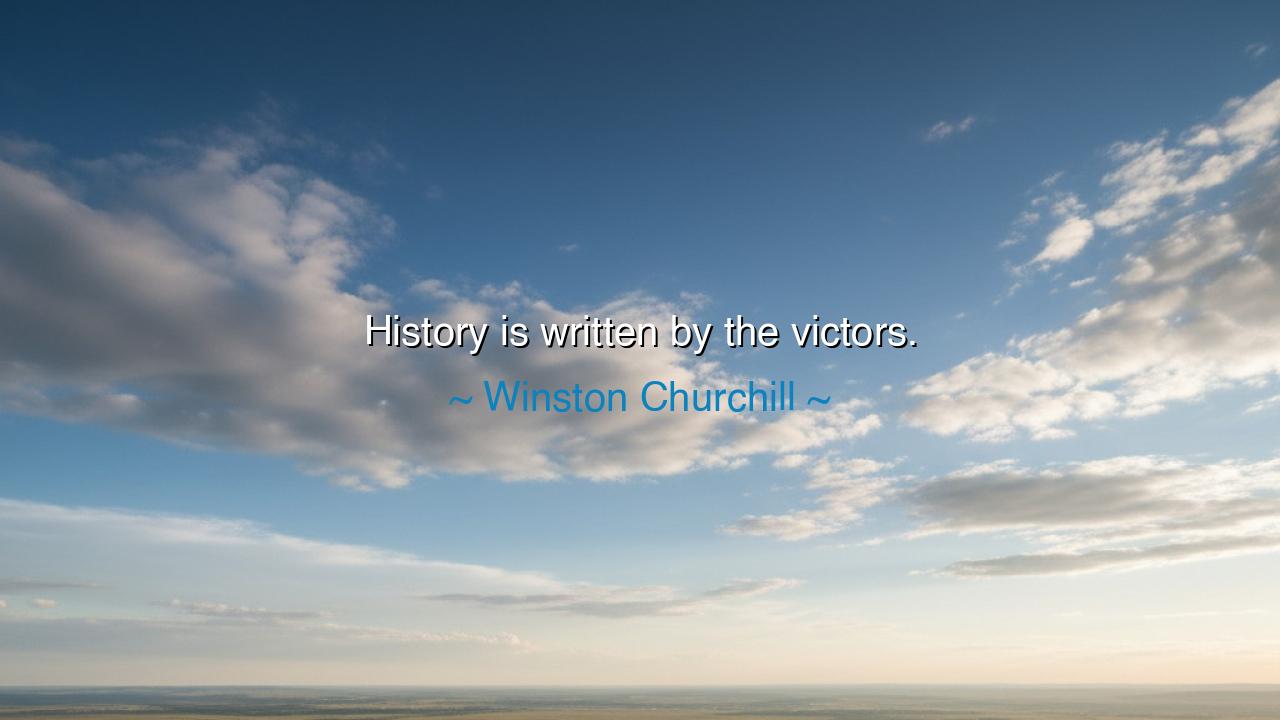
History is written by the victors.






“History is written by the victors.” Thus spoke Winston Churchill, the indomitable lion of Britain, whose words have echoed through the corridors of time as both wisdom and warning. In this single sentence, he unveiled one of the deepest truths of human civilization — that history, the story of humanity itself, is not always the voice of truth, but often the echo of power. The victors of wars, the conquerors of nations, the rulers of empires — these are the ones who hold the pen that records the deeds of men. And the pen, more powerful than the sword, can turn defeat into disgrace, and conquest into glory. Churchill, who lived through the fires of world war, knew this truth well: that what the world remembers is not always what truly was.
In these words lies both tragedy and triumph. For though truth is eternal, its telling is mortal, bound to the voices of those who survive and prevail. When a battle ends and the smoke clears, the dead cannot speak; their stories perish with them. The victors, standing upon the ashes, proclaim their version of events — and so history is shaped not by impartial justice, but by human hands. Power, in its final act, does not merely conquer the land — it conquers memory. Thus, whole civilizations may vanish, and their wisdom may be buried beneath the narratives of their conquerors. The library of Alexandria burned once by fire, but countless times by the silence of forgotten tongues.
Consider the tale of the Roman conquest of Carthage. When Rome triumphed after years of bloody conflict, they razed Carthage to the ground and sowed its fields with salt, ensuring nothing would ever grow again. But they did more than destroy the city — they destroyed its story. The Carthaginians left no record of their defense, no songs of their fallen heroes. All that remains of their civilization comes through Roman eyes, through the writings of their enemies. To the Romans, they were barbarians; to themselves, perhaps they were patriots, defenders of home. Yet history, as the victors wrote it, did not preserve their truth. In that silence, we see the shadow of Churchill’s words: the victors’ ink stains the memory of the world.
Churchill himself, as both historian and statesman, understood the dual nature of his own saying. For he was both a maker of history and a recorder of it. When he led Britain through the darkness of the Second World War, his speeches — fierce, defiant, and filled with hope — helped shape not only victory but the story of victory. Yet even he, in moments of reflection, knew that the defeated — the millions crushed beneath the boots of empire, the soldiers who fought and lost on every side — had their own truths that history would seldom tell. Thus his words are not boast, but confession: an acknowledgment that every written triumph hides unspoken suffering.
But though history may be written by the victors, truth itself is never conquered. In every age, there arise voices that seek to uncover what was buried. The scrolls of the oppressed resurface; the songs of the forgotten are sung anew. The centuries may favor the powerful, but time, in its slow justice, reveals the deeper patterns of human striving — that no one side holds virtue entirely, and no one victory lasts forever. Empires fall, new nations rise, and the stories of the vanquished are found in ruins, ready to speak again. Thus, even as history bends toward the victors, the soul of truth continues its quiet work beneath the surface, waiting to be rediscovered by those who seek it.
The lesson of Churchill’s words, then, is not despair, but vigilance. If history is written by the victors, then let every generation learn to read between the lines. Let them question what is told, and listen for what is missing. Seek not only the glory of kings, but the cries of the common man; not only the proclamations of empires, but the whispers of the enslaved. For the duty of the wise is not merely to inherit history, but to discern its truth. Every citizen, every student, every seeker of knowledge must remember: what is written is not always what is right. To understand the past, one must look with eyes that see beyond victory, beyond defeat, into the shared heart of humanity itself.
So, my child of the future, remember this teaching. When you study the stories of old, do not bow before them as if they were sacred beyond question. Ask who wrote them, and for whom. Seek out the forgotten voices, for in them lies the fuller measure of truth. The victors may write the first draft of history, but the wise and the just must write its final one. Let your pursuit of understanding be guided not by pride, but by empathy — for in listening to all sides, you approach the essence of what it means to be human.
For though Churchill spoke in the voice of a conqueror, his words carry a timeless humility: that no one truly owns history, for history belongs to the whole of humankind. The pen of power may write the tale, but the spirit of truth — eternal, patient, and unyielding — will one day correct it. Seek that spirit always, and you will not only learn history; you will help redeem it.






AAdministratorAdministrator
Welcome, honored guests. Please leave a comment, we will respond soon